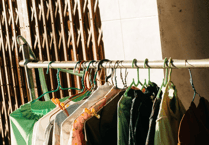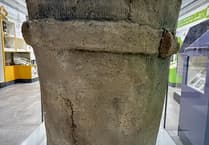It is called, I believe, ‘communing with nature’. Despite being very much a countryman – a farmer’s son – it is something I’ve never been good at; other matters have so very often got in the way – an urgent family issue, a problem at work, far too often foolish and pointless stress regarding the results of football fixtures fulfilled by Plymouth Argyle. Recently, however, on a pleasant sunny day, I did just that – I communed.
The location of my ‘communing’ will come as no surprise to anyone who knows me. I had found myself running an errand on the Bere Peninsula and, for once, I took the opportunity to plonk myself down on a comfortable bench on the Devon side of the Tamar, no more than half a mile from where I was born and bred; indeed, throughout my long life never have I dwelt at a permanent address more than five miles from this stunning waterway as it meanders on its sedate way to the Atlantic ocean.
Some far-sighted official (a rare specimen indeed) saw fit to designate the Tamar valley an Area of Outstanding Natural Beauty; it is of course, and because major development and change will not be allowed, it will, on the whole remain so. As I sat I took in the view; the lush fields on the Cornish side gave solace to the eyes, whilst the large number of small boats and yachts bobbing up and down on the water had an almost mesmeric effect on me. Birds proliferated; songbirds, waterfowl, waders, all ignored me – had I sat there in mid-winter I would have seen numerous Avocets who flock to this part of the river during their annual migration, one of the few places in Britain where they are to be seen.
As I basked in the sunshine, I mused – surely a privilege of the elderly. It occurred to me that anyone sitting in this lovely spot some 700 years or so ago might well be considering problems of a similar nature to that which we face today. For they had their own Covid 19 – indeed, a plague far worse than Coronavirus. For the ‘Black Death’ slew a vast percentage of the population of these islands and so much of Europe – it is suggested up to a third of the population perished.
The plague caused, amongst other things, a massive shortage of labour. With Covid it manifests itself in lorry drivers being coveted as they have become as rare as ‘hen’s teeth’; similarity exists in that medieval farm workers became greatly sought-after because there were relatively few of them; thus they were in a strong position to demand more than the pittance which had been theirs for centuries. In present times, seasonal workers on the land – plus those in the leisure and catering industries – are likewise in a strong position when it comes to improved pay and conditions.
Also back in the 14th century our land was fighting the 100 Years war against France; again little really changes, for we and the French have been, largely, adversaries for the past thousand years. Granted our armies do not lock horns these days but the political air often is acrid with animosity; not long ago there was Brexit and very recently the defence pact between the UK, Australia and the USA; although largely aimed at negating Chinese aggression in the Pacific, AUKUS resulted in the cancellation of a major arms deal between Australia and France, with some of the money instead flowing in the direction of the UK. Incensed, French toys were well and truly thrown out of French prams. This acidic old scribe has to confess to being unusually upbeat over anything which upsets the rulers in Paris.
As I continued to ‘soak up the rays’ the realisation swept over me that the golden globe in the sky was actually generating far more warmth than I was expecting for the time of year; I had sweat on my brow. It is said that a majority of young people in the world today have climate change as their main fear and concern; they are surely correct. My generation will probably have ‘shuffled off’ before its fullest effects are felt, but unless the nations of the world change their ways – rapidly – the outlook for the human race is grim.
Every nation has a part to play, but three in particular need to confront their pollution of the world – India, China and the USA; this trio are responsible for over 50% of the harmful emissions which are the cause of this potential calamity. To borrow a powerful slogan, ‘There is no Planet B.’
After a while it struck me that, even given the delightful venue I had chosen, this communing and especially musing was not in any way proving to be good for my mental health. I returned home hoping to lighten my mood; there a small packet awaited. It contained testing kits which would tell if one was suffering from Coronavirus. What was printed on the back? ‘Made in China’! It was beyond irony; my outrage abounded at them seemingly profiting from a catastrophe it would appear they have bequeathed to all. My only consolation? It did not say ‘Made in France’.

.png?width=209&height=140&crop=209:145,smart&quality=75)


